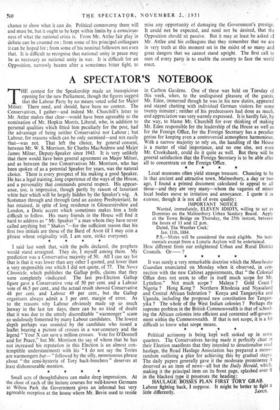A SPECTATOR'S NOTEBOOK
HE contest for the Speakership made an inauspicious opening for the new Parliament, though the figures suggest that the Labour Party by no means voted solid for Major Milner. There need, and should, have been no contest. The Conservatives, I gather—and indeed Mr. Churchill's letter to Mr. Attlee makes that clear—would have been agreeable to the nomination of Mr. Hopkin Morris, Liberal, who, in addition to personal qualities which fitted him peculiarly for the post, had the advantage of being neither Conservative nor Labour ; but Labour, for reasons which can be only surmised—and not easily that—was not. That left the choice, by general consent, between Mr. W. S. Morrison, Sir Charles MacAndrew and Major James Milner, Deputy-Speaker since 1943. It is very unlikely that there would have been general agreement on Major Milner, and as between the two Conservatives Mr. Morrison, who has been spoken of as a potential Speaker for years, was the natural choice. There is every prospect of his making a good Speaker. He has a legal training, long experience of the ways of the House, and a personality that commands general respect. His appear- ance, too, is impressive, though partly by reason of luxuriant white hair which will be largely hidden by the Speaker's wig. A Scotsman through and through (and an austere Presbyterian), he has retained, in spite of long residence in Gloucestershire and London, a Doric accent which sometimes makes him a little difficult to follow. His many friends in the. House will find it bard to address as " Mr. Speaker " a man whom they have never called anything but " Shakes "—for the sufficient reason that his first two initials are those of the Bard of Avon (if I may coin a phrase whose originality will, I am sure, strike everyone).


































 Previous page
Previous page